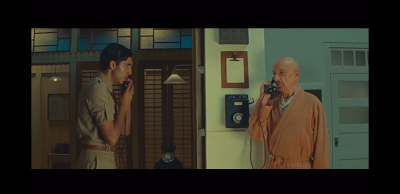Wes Anderson's final Roald Dahl adaptation for Netflix is less 'Jackanory' but much more 'Tales of the Unexpected'.
It's one of those stories Dahl liked to concoct for adults, usually with a sting in the tale.
Fans of the old ITV 'Tales of the Unexpected' series, repeated daily in the UK at the moment on Sky Arts, will recognise the same traits.
But in bringing this morality tale to the screen, Anderson also pulls it off with a panache that the ITV series could only dream of.
Dev Patel assumes the role of principal narrator this time in 'Poison', only occasionally handing over his duties to Ralph Fiennes' Dahl who figured in the three other Netflix adaptations of the author's work - 'The Wonderful Story of Henry Sugar,' 'The Swan' and 'The Ratcatcher'.
Patel is Timber Woods, an Englishman in India summoned to the home of an acquaintance, Benedict Cumberbatch's Harry Pope because of an emergency.
When he arrives at Pope's house, he finds him lying still on his bed, with a book perched on his chest and a look of silent terror on his face.
Pope tells Woods a snake has crawled onto his belly underneath his bed sheet and has fallen asleep on it.
If it bites him, there's a chance his blood may turn into a tar like substance.
Both try to figure out a way of getting the snake off Harry Pope without startling it.
However as they deliberate, Harry gets increasingly stressed and struggles not to snap at Timber.
Realising an antidote may be required to administer very quickly if the snake bites, Timber phones Ben Kingsley's Dr Ganderbai who immediately rushes round to the house.
After fretting about the right thing to do, Dr Ganderbai decides to use chloroform to safely remove the snake from the bedclothes.
Does his plan succeed?
In keeping with Anderson's previous three Dahl inspired short films, 'Poison' is an extremely playful affair.
Arguably it's the most playful of the four Dahl short films, with the fourth wall being broken regularly by its characters, Robert D Yeoman's camera gliding between the partitioned set to capture the action and Patel also stepping around the set to move between rooms.
Once again Adam Stockhausen's production design, Claire Peerless' art direction, Anna Pinnock's set decoration and Kasia Walicka Maimone's costumes rise to the challenge that Anderson sets for them, following his formula for striking visuals.
For much of the 17 minute running time, though, 'Poison' plays out like a taut thriller.
Then it takes a sharp turn and reveals an unpleasant truth about a character which makes you realise what the poison mentioned in the title is really referring to.
It's a well executed, uncomfortable twist and it's very Dahl.
As you would expect, Anderson extracts mischievous performances from a very willing cast.
Patel, Cumberbatch and Kingsley are on top form in the short whose Indian setting proves crucial.
Fiennes, however, gets to enjoy the final shots of Anderson's Roald Dahl project as the Norwegian Welsh writer.
Arguably the most ambitious of the four short films, 'Poison' neatly brings the whole project to a close.
Over the course of the four films, the director literally takes his audience from sugar to poison.
But he has also moved himself into the position of the best cinematic interpreter of Dahl's work.
With 'Poison' and its three fellow Dahl short films, the Texan proves he is still capable of gelling his distinctive style with substance.
The mojo that was missing in recent feature films is back.
Hopefully he can hang onto it when making the next movie.
('Poison' was made available for streaming in the UK and Ireland on September 30, 2023)







Comments
Post a Comment